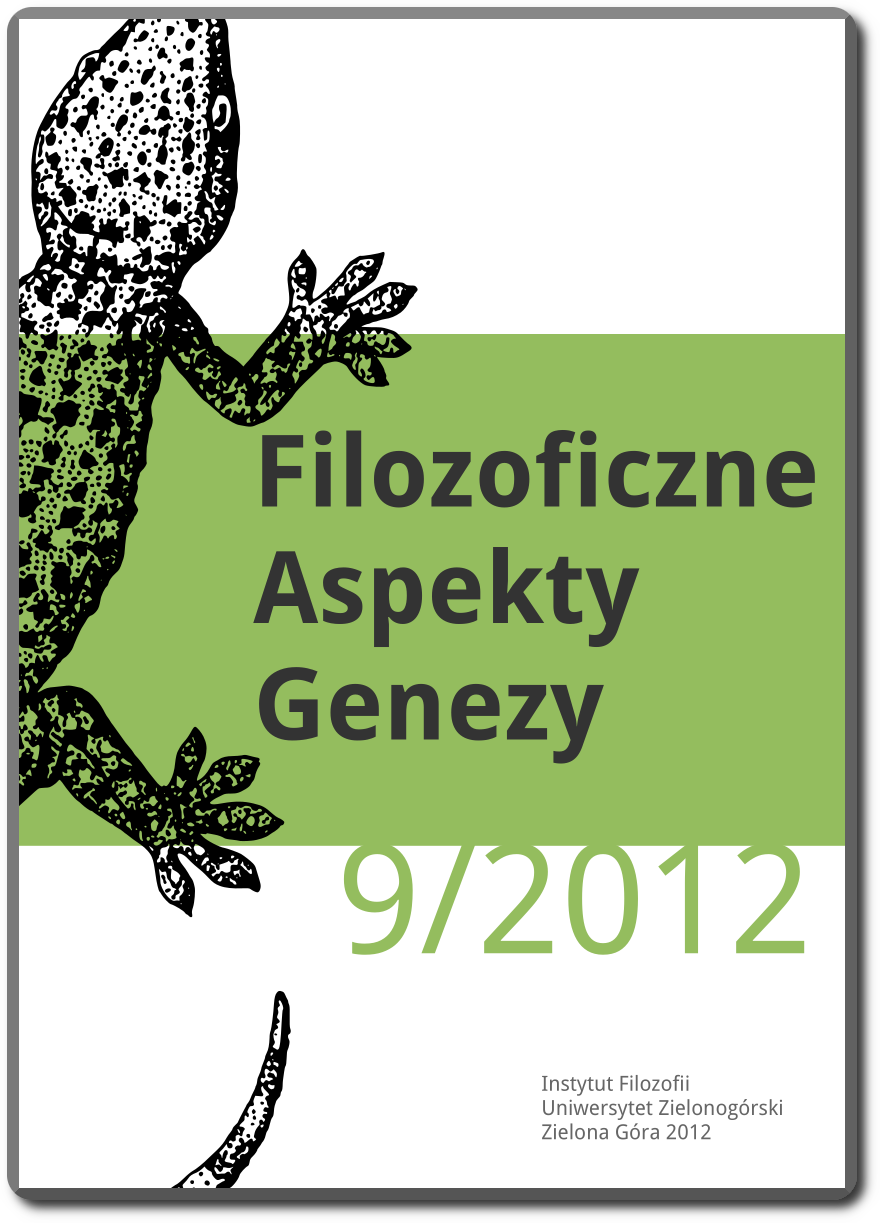Opublikowane 21.05.2021
Słowa kluczowe
- argument z Boga w lukach wiedzy,
- argument z projektu,
- apologetyka,
- historia nauki,
- filozofia
- teologia,
- pragmatyzm ...More

Utwór dostępny jest na licencji Creative Commons Uznanie autorstwa 4.0 Międzynarodowe.
Jak cytować
Larson Ronald G., O argumencie z Boga w lukach wiedzy raz jeszcze, Filozoficzne Aspekty Genezy 2021, vol. 9 pp. 199-220, https://doi.org/10.53763/fag.2012.9.73
Abstrakt
Chociaż argumenty z projektu, mające przemawiać za istnieniem Boga, są czasem odrzucane, gdyż uznaje się je za apologetykę wykorzystującą argument z Boga w lukach wiedzy, to jednak powody ich kwestionowania, mające podstawę w historii nauki, filozofii, religii i pragmatyzmie, nie są aż tak silne, jak się to często insynuuje. Twierdzę, że korzystanie z wielorakich dostrzegalnych w świecie przyrody świadectw projektu oraz ich regularne uaktualnianie w celu uzgodnienia z nowymi ustaleniami, może stanowić rozsądne i przekonujące podejście do apologetyki.
Downloads
Download data is not yet available.
Bibliografia
- Dawkins Richard, Bóg urojony, przeł. Piotr J. Szwajcer, Wydawnictwo CiS, Warszawa 2007.
- Stenger Victor J., God: The Failed Hypothesis. How Science Shows that God Does Not Exist, Prometheus Books, New York 2007.
- Harris Sam, The End of Faith: Religion, Terror, and the Future of Reason, W. W. Norton and Co., New York 2004.
- Collins Francis S., Język Boga. Kod życia — nauka potwierdza wiarę, przeł. Małgorzata Yamazaki, Świat Książki, Warszawa 2008.
- Schroeder Gerald L., The Hidden Face of God: Science Reveals the Ultimate Truth, Simon and Schuster Adult Publishing Group, New York 2002.
- Rana Fazale and Ross Hugh, Origins of Life: Biblical and Evolutionary Models Face Off, Navpress, Colorado Springs 2004.
- Lewis Clive S., Mere Christianity, C. S. Lewis Pte. Ltd. 1952, London 1980.
- Barr Stephen M., Fizyka współczesna a wiara w Boga, przeł. Andrzej Molek, Techtra, Wrocław 2005.
- Gingerich Owen, Boski wszechświat, przeł. Jarosław Włodarczyk, Wydawnictwa Uniwersytetu Warszawskiego, Warszawa 2008.
- Larmer Robert, „Is There Anything Wrong with «God of the Gaps» Reasoning?”, International Journal for Philosophy of Religion 2002, vol. 52, s. 129-142.
- Drummond Henry, The Lowell Lectures on the Ascent of Man, Hodder and Stoughton, Glasgow 1904.
- Bonhoeffer Dietrich, „Letter to Eberhard Bethge” (29 May 1944), w: Letters and Papers from Prison, Simon and Schuster, New York 1997, s. 310-312.
- Bube Richard, Putting It All Together, University Press of America, New York 1995.
- Peacocke Arthur R., Creation and the World of Science, Oxford University Press, Oxford 1979.
- Ratzsch Del, Nature, Design and Science, SUNY Press, Albany 2001.
- Susskind Leonard, Kosmiczny krajobraz. Dalej niż teoria strun, przeł. Urszula i Mariusz Seweryńscy, Na Ścieżkach Nauki, Prószyński i S-ka, Warszawa 2011.
- Jonathan Haidt, The Happiness Hypothesis: Finding Modern Truth in Ancient Wisdom, Basic Books, New York 2006.
- McGrath Alister i McGrath Joanna Collicutt, Bóg nie jest urojeniem. Złudzenie Dawkinsa, przeł. Jerzy Wolak, Wydawnictwo WAM, Kraków 2009.
- Dawkins Richard, „God’s Utility Function”, Scientific American November 1995.
- Russell Bertrand, Religia i nauka, przeł. Barbara Stanosz, Instytut Wydawniczy „Książka i Prasa”, Warszawa 2006.
- Polanyi Michael, Personal Knowledge: Towards a Post-Critical Philosophy, The University of Chicago Press, Chicago 1962.
- Flew Antony, Bóg istnieje. Dlaczego najsłynniejszy ateista zmienił swój światopogląd, przeł. Robert Pucek, Fronda, Warszawa 2010.
- Ratzsch Del, Science and Its Limits, 2nd ed., InterVarsity Press, Downers Grove 2000.
- Boyer Carl B., A History of Mathematics, 2nd ed., Wiley, New York 1968.
- Ribas Albert, „Leibniz’ Discourse on the Natural Theology of the Chinese and the Leibniz- Clarke Controversy”, Philosophy East and West 2003, vol. 53, no. 1, s. 64-86.
- Collins Jack, „Miracles, Intelligent Design, and God-of-the-Gaps”, Perspectives on Science and Christian Faith 2003, vol. 55, no. 1, s. 22-29.
- Rusbult Craig, „God of the Gaps: What Does It Mean? Should We Say It?”, www.asa3.org/ASA/Education/origins/gaps-cr.htm.
- Isaac Randy, „Od luk w wiedzy do wniosku o istnieniu Boga”, przeł. Małgorzata Gazda, Filozoficzne Aspekty Genezy 2012, t. 9, s. 187-198, http://www.nauka-a-religia.uz.zgora.pl/index.php?action=tekst&id=235 (13.12.2012).
- Hazen Robert M., Genesis: The Scientific Quest for Life’s Origins, Joseph Henry Press, Washington, DC. 2005.
- Craig William Lane, Reasonable Faith: Christian Truth and Apologetics, Crossway Books, Wheaton 1994.
- Kuhn Thomas S., Przewrót kopernikański. Astronomia planetarna w dziejach myśli Zachodu, przeł. Stefan Amsterdamski, Pejzaże Myśli, Prószyński i S-ka, Warszawa 2006.
- Kurzweil Ray, The Singularity Is Near: When Humans Transcend Biology, Penguin Books, New York 2005.
- Snoke David, „In Favor of God-of-the- Gaps Reasoning”, Perspectives on Science and Christian Faith 2001, vol. 53, no. 3, s. 152-158.
- Jastrow Robert, God and the Astronomers, George McLeod Limited, Toronto 1992.
- Darwin Karol, O powstawaniu gatunków drogą doboru naturalnego, czyli o utrzymywaniu się doskonalszych ras w walce o byt, tekst polski na podstawie przekładu Szymona Dicksteina i Józefa Nusbauma opracowały Joanna Popiołek i Małgorzata Yamazaki, Wydawnictwa Uniwersytetu Warszawskiego, Warszawa 2009.
- Levine Joseph, „Materialism and Qualia: The Explanatory Gap”, Pacific Philosophical Quarterly 1983, vol. 64, s. 354-361.
- Chalmers David J., The Conscious Mind, Oxford University Press, New York 1996.
- Chalmers David J., „Facing Up to the Problem of Consciousness”, Journal of Consciousness Studies 1995, vol. 2, no. 3, s. 200-219.
- Crick Francis and ORGEL Leslie E., „Directed Panspermia”, Icarus 1973, vol. 19, s. 341-346.
- Kitchen Kenneth A., On the Reliability of the Old Testament, Eerdmans, Grand Rapids 2003.
- Hume Dawid, Badania dotyczące rozumu ludzkiego, przeł Jan Łukasiewicz i Kazimierz Twardowski, Arcydzieła Wielkich Myślicieli, Ediciones Altaya Poska i De Agostini Polska, Warszawa 2001.
- Flew Antony, The Presumption of Atheism and Other Philosophical Essays on God, Freedom and Immortality, Pemberton/Elek, New York 1976.
- Plantinga Alvin, „God of the Gaps? (Precisely What Is It?)” www.asa3.org/ASA/Education/origins/gaps-ap.htm.
- Swinburne Richard, Is There a God?, Oxford University Press, Oxford 1997.
- Richardson M.K., Hanken J., Gooneratne M.L., Pieau C., Raynaud A., Selwood L., and Wright G.M., „There Is No Highly Conserved Embryonic Stage in the Vertebrates: Implications for Current Theories of Evolution and Development”, Anatomy and Embryology 1997, vol. 196, s. 91-106.
- Weiner J.S., Oakley F.P., and Clark W.E. Le Gros, „The Solution of the Piltdown Problem”, Bulletin of the British Museum (Natural History) Geology 1953, vol. 2, s. 139-146.
- Dawkins Richard, Ślepy zegarmistrz, czyli jak ewolucja dowodzi, że świat nie został zaplanowany, przeł. Antoni Hoffman, Państwowy Instytut Wydawniczy, Warszawa 1997.
- Saltzberg S.L., White O., Peterson J., and J.A., „Microbial Genes in the Human Genome: Lateral Transfer or Gene Loss?”, Science 2001, vol. 292, s. 1903-1906.
- Pennisi E., „Is It Time to Uproot the Tree of Life?”, Science 1999, vol. 284, s. 1305-1307.
- Pennisi E., „Sequences Reveal Borrowed Genes”, Science 2001, vol. 294, s. 1634-1635.
- Rokas A., „Genomics and the Tree of Life”, Science 2006, vol. 313, s. 1897-1899.
- Shermer Michael, „Believing in Belief”, Science 2006, vol. 311, s. 471-472.
- Thorson Walter R., „Legitimacy and Scope of «Naturalism» in Science”, Perspectives on Science and Christian Faith 2002, vol. 54, no. s. 2-11.



